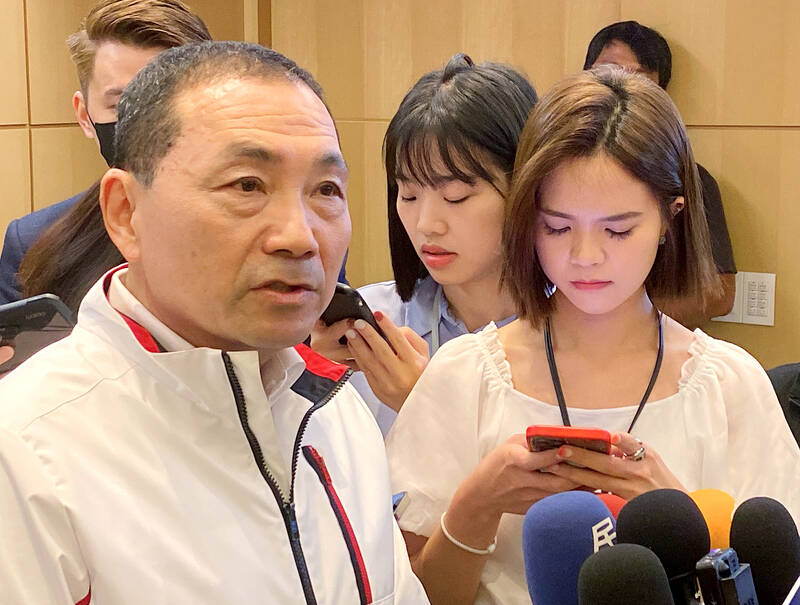The Democratic Progressive Party (DPP) and New Taipei City Mayor Hou You-yi (侯友宜) yesterday clashed over energy policy after Hou reiterated that he would back the utilization of nuclear power plants if elected president.
Hou is the Chinese Nationalist Party’s (KMT) candidate in next year’s presidential election.
Taiwan might not have enough electricity reserves to ensure a stable power supply for the nation’s chipmakers to retain their competitive edge, Hou told a news conference after a meeting at city hall.

Photo: CNA
The DPP government’s plan to phase out nuclear power by 2025 is unrealistic and switching to gas-fired power plants would harm the environment, Hou said, adding that a mix of nuclear and renewable power should be the way forward.
DPP spokesman Chang Chih-hao (張志豪) said Hou should back his claims with evidence or “be exposed as the ignoramus in national policy and energy issues that he truly is.”
The KMT has for years made baseless allegations that Taiwan has an inadequate energy supply, but it was in 2016, the last year of Ma Ying-jeou’s (馬英九) presidency, when the nation’s operating reserves fell to a nadir of 1.64 percent, Chang said.
Ma of the KMT approved the construction of fewer power plants than any president before or since, he said, adding that Hou, then-deputy mayor of New Taipei City, did not voice any concerns about energy supply.
Over the past five years, Taiwan Power Co (Taipower) issued only five orange and one red alert for low operating reserves, he said.
President Tsai Ing-wen (蔡英文) has approved the construction of gas-fired plants that would increase the nation’s energy production by 91,000 kilowatts per hour (kWh), or triple the combined output of the Jinshan Nuclear Power Plant in New Taipei City’s Shihmen District (石門) and the Guosheng Nuclear Power Plant in New Taipei City’s Wanli District (萬里), Chang said.
Taiwan would not have an energy shortage as long as it continues to invest in energy storage technology and power grid resiliency, he said.
Taiwan is to generate 30,000 kWh of renewable electricity by 2030 as per the RE100 initiative, to which Taiwan Semiconductor Manufacturing Co (TSMC) and the nation’s top enterprises have pledged themselves, Chang said.
The initiative’s definition of renewables does not include nuclear power, he said, adding that Hou does not understand the needs of industry or Taiwan’s international obligations.
Hou’s latest remarks are part of his pattern of taking credit for positive achievements, while pinning the blame for all negative developments on the central government, said Chen Shih-kai (陳世凱), spokesperson for Vice President William Lai’s (賴清德) presidential campaign.
The New Taipei City Government has sued Taipower multiple times over the past 10 years to prevent the storage of radioactive waste from nuclear power plants in its jurisdiction, he said.
Hou must explain to voters how he would deal with the issue of nuclear waste if elected, Chang said.
“Hou cannot push for nuclear power on the one hand and give empty platitudes [about storage] on the other,” he said.

Taiwan has received more than US$70 million in royalties as of the end of last year from developing the F-16V jet as countries worldwide purchase or upgrade to this popular model, government and military officials said on Saturday. Taiwan funded the development of the F-16V jet and ended up the sole investor as other countries withdrew from the program. Now the F-16V is increasingly popular and countries must pay Taiwan a percentage in royalties when they purchase new F-16V aircraft or upgrade older F-16 models. The next five years are expected to be the peak for these royalties, with Taiwan potentially earning

STAY IN YOUR LANE: As the US and Israel attack Iran, the ministry has warned China not to overstep by including Taiwanese citizens in its evacuation orders The Ministry of Foreign Affairs (MOFA) yesterday rebuked a statement by China’s embassy in Israel that it would evacuate Taiwanese holders of Chinese travel documents from Israel amid the latter’s escalating conflict with Iran. Tensions have risen across the Middle East in the wake of US and Israeli airstrikes on Iran beginning Saturday. China subsequently issued an evacuation notice for its citizens. In a news release, the Chinese embassy in Israel said holders of “Taiwan compatriot permits (台胞證)” issued to Taiwanese nationals by Chinese authorities for travel to China — could register for evacuation to Egypt. In Taipei, the ministry yesterday said Taiwan

‘LIKE-MINDED PARTNER’: Tako van Popta said it would be inappropriate to delay signing the deal with Taiwan because of China, adding he would promote the issue Canadian senators have stressed Taiwan’s importance for international trade and expressed enthusiasm for ensuring the Taiwan-Canada trade cooperation framework agreement is implemented this year. Representative to Canada Harry Tseng (曾厚仁) in an interview with the Central News Agency (CNA) said he was increasingly uneasy about Ottawa’s delays in signing the agreement, especially as Ottawa has warmed toward Beijing. There are “no negotiations left. Not only [is it] initialed, we have three versions of the text ready: English, French and Mandarin,” Tseng said. “That tells you how close we are to the final signature.” Tseng said that he hoped Canadian Prime Minister Mark Carney

POSITIVE DEVELOPMENT: Japan and the US are expected to hold in-depth discussions on Taiwan-related issues during the meeting next month, Japanese sources said The holding of a Japan-US leaders’ meeting ahead of US President Donald Trump’s visit to China is positive news for Taiwan, former Japan-Taiwan Exchange Association representative Hiroyasu Izumi said yesterday. After the Liberal Democratic Party’s landslide victory in Japan’s House of Representatives election, Japanese Prime Minister Sanae Takaichi is scheduled to visit the US next month, where she is to meet with Trump ahead of the US president’s planned visit to China from March 31 to April 2 for a meeting with Chinese President Xi Jinping (習近平). Japan and the US are expected to hold in-depth discussions on Taiwan-related issues during the